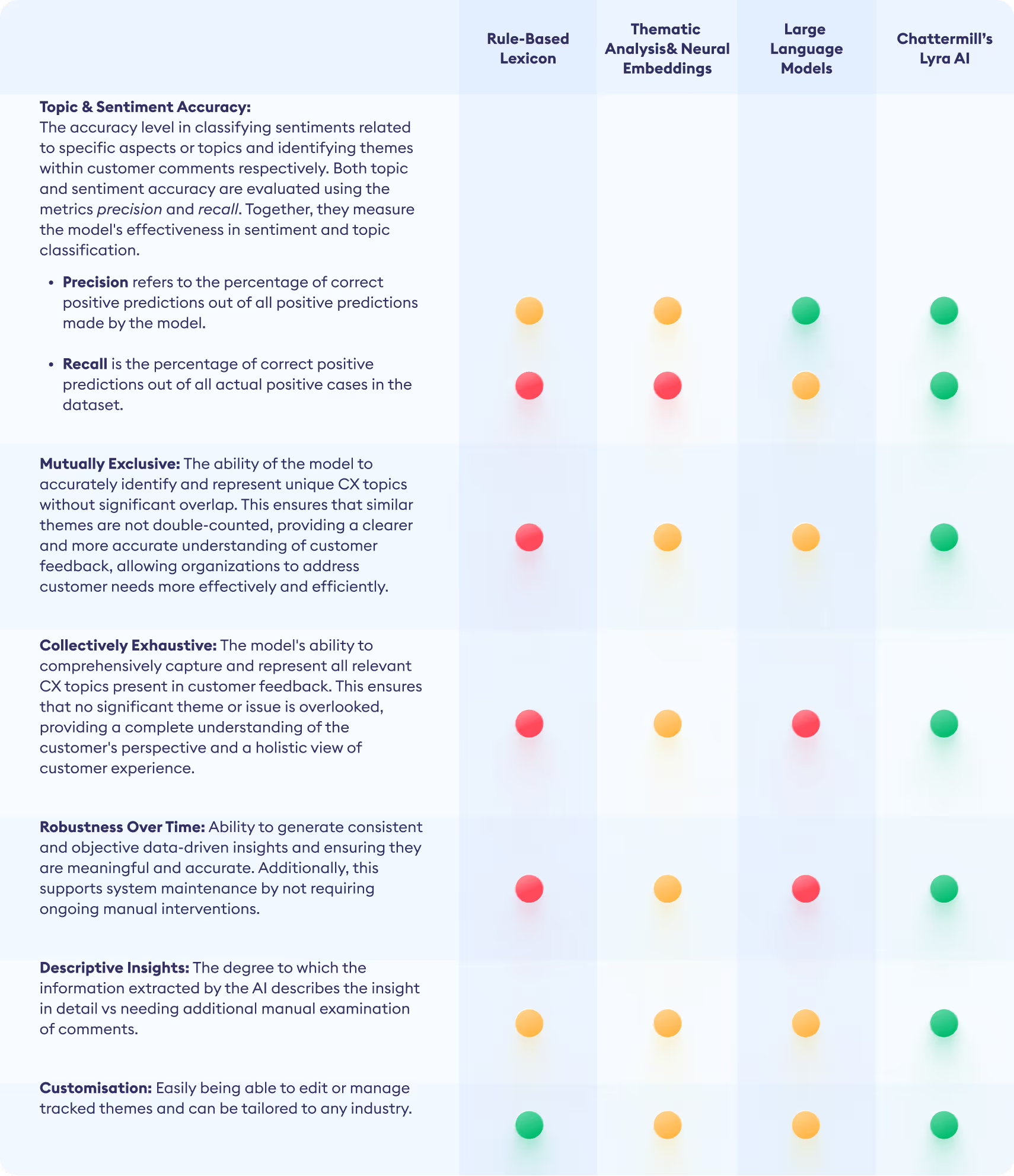It’s no surprise business is responding to the rapidly evolving field of Generative Artificial Intelligence (GenAI). It’s driven by tools like ChatGPT and Gemini, and nothing has captured attention quite so effectively since social media hit the scene promising free technology to get closer to their customers.
So, it makes sense that Customer Experience (CX) leaders want to explore how AI can help them find new ways to connect with their customers while gaining competitive advantage.
But if there’s one thing we learned about social media over time, it’s this – do not get distracted by the hype.
In a 2023 poll, Gartner found that, of more than 2,500 executives, 38% indicated that customer experience and retention is the primary purpose of their generative AI investments. In the same report, Gartner sounded a note of caution, advising leaders to connect use cases to KPIs to ensure that any AI project adds value by creating new revenue or better customer experiences.
Right now, enterprise companies are thinking about how they can scale proven use cases with less technical knowledge to drive business goals. Most existing tools don’t connect the core capabilities that businesses need to drive enterprise goals and meet CX objectives. This results in a misalignment between the hype and expectations of new technology and the ultimate (disappointing) impact of the tech as a result of not being sufficiently aligned with core CX objectives.
And that’s the gap in the market that Chattermill has filled for the CX community. Let’s dig in to find out more about Chattermill’s breakthrough AI technology – Lyra AI.
What is Lyra?
Lyra is Chattermill’s proprietary technology for gleaning insights from CX data. Lyra is a powerful blend of AI methodologies designed to help companies analyze customer feedback so they can confidently answer business questions and make critical decisions. It works at scale across numerous internal and external sources of customer feedback to provide CX Intelligence.
AI for CX is about understanding customers – what they think and how they feel. Chattermill’s goal with AI is to straddle the great divide between tactical and strategic decisions. To achieve this goal, Lyra was created by merging different technologies to provide a depth of insight and immediacy from customer feedback not seen before.
We’re using the best technology to solve problems across the wider business and initiate Experience-Led Growth. In short, Lyra:
- Provides transformational insights by identifying the key drivers of feedback and analyzing pain points throughout the entire customer journey.
- Unifies customer data in one platform that is embedded in all the teams who need CX Intelligence to meet or exceed their KPIs.
- Builds an agile, enterprise ecosystem for customer feedback that allows the processing of massive volumes of data while maintaining enterprise-level security and compliance standards. It seamlessly integrates with CX, support, product, and marketing tools.
Lyra’s architecture
Chattermill is an old hand at using AI to deliver value to CX teams. We’ve been at it since way before the hype started about Generative AI. But make no mistake, we’re not a “tech first” company. Our priority has always been helping CX teams design better customer experiences to drive growth. That’s the problem we’re addressing.
Without getting all nerdy, Chattermill’s proprietary Natural Language Processing platform is an advanced AI system developed from more than 8 years of work to help customer-centric businesses understand what their customers think and feel.
Lyra blends multiple technologies to optimize the quality and accuracy of customer feedback and deliver highly actionable insights. We’ve been using Transformers (deep learning architecture) because it’s the best form of context-sensitive tech for CX. For example, words people use to describe customer service may differ between industries. “Fast service” may be seen as favorable in banking and take-out restaurants but not at all positive for fine dining experiences.
As new AI tech is developed, we incorporate it when and where it’s most useful, continuing to build on what we’ve already done.
Lyra is not one flavor of AI. We assess the best AI technology for a specific function and incorporate it to uncover customer insights. That’s how we enable CX teams to influence long-term strategy and vision while ensuring sustained growth and success.
What can Lyra do for your team?
- Shine a spotlight on Voice of Customer (VoC) metrics, at scale. You can analyze large volumes of NPS, CSAT and customer feedback data to quickly understand what’s driving negative and positive sentiment about your brand.
- Improve product and services. Customer feedback is full of clues about what customers like or why they’re unhappy. You can understand the true differentiators of your products and services to gain competitive advantage.
- Provide transparency to the customer journey. Accurately mapping customer journeys allows you to maximize Experience-Led Growth through repeat purchases, upselling and cross-selling opportunities.
- Improve retention. Understanding why loyal customers keep coming back allows you to optimize growth opportunities and fix the problems that deter one-time purchasers from returning.
- Drive growth and increase profitability. Clear insights into purchasing behaviors, emotional drivers of high spenders, and which products and services have the highest basket values help you continually increase your Customer Lifetime Value.
What can Lyra do for your customers?
- Provide a true omni-channel experience. Reducing friction in your customer journeys and learning where you’re falling short on customer expectations ensures you can correct gaps in your customer experience, remain focused on channels that are the most profitable, and drive digital conversions at a greater rate than ever before.
- Improve customer satisfaction. Modern consumers respond to ease, convenience, and value for money (regardless of price point). Analyzing customer feedback with precision and at scale allows you to design the ideal experience that keeps them leaving positive reviews.
- Reduce the need for contact with customer service or support. Consumers prefer as much self-service capability as possible. CX Intelligence helps you ensure their experience runs smoothly any time of the day or night by anticipating seasonal shifts in contact volume, improved chatbot success, meatier FAQs, and near real-time response to trending problems.
- Foster brand loyalty. Great reviews are a sign of customer satisfaction, one that lets you know how to recognize and reward your best, most profitable customers. Because customer satisfaction is linked directly to customer experience, you can create a positivity loop for your brand that keeps your current customers happy and continues to attract new fans of your products and services.
What makes Lyra different from other AI models for customer experience?
Okay, I’m going to get a little nerdy here after all. Bear with me, it’s not going to be that bad.
Each AI model has strengths and weaknesses when it comes to customer feedback analysis. Here’s a high-level comparison of AI technology used for CX analysis.
Rule-Based Lexicon uses predefined rules to categorize written text. Words and phrases are manually defined with positive or negative sentiments. Customer feedback text is scanned and sentiment is calculated based on positive and negative words counts.
Technology: Medallia, Clarabridge
- Pros: Simple and consistent
- Cons: Limited accuracy; does not understand nuance, irony, or sarcasm; resource intensive to set up and continually manage rules
Thematic Analysis and Neural Embeddings is predominately used in psychology, sociology, and anthropology. It focuses on identifying and interpreting themes or patterns in data. Human validation is required to filter and select relevant keyword-based themes.
Technology: Enterpret, unitQ, Thematic
- Pros: Flexible, authentic
- Cons: Time-consuming, limited ability to understand context
Large Language Models leverage extensive training data and deep learning principles to extract topics and sentiments from customer feedback then deliver the results in natural, human-like text.
Technology: ChatGPT-4
- Pros: Sophisticated and “human”
- Cons: Unreliable, inaccurate, produces different outputs with every analysis
Chattermill’s in-house Natural Language Processing integrates the strengths of Aspect Based Sentiment Analysis (ABSA) with supervised and self-supervised learning. Themes and sentiments are harmonized with Large Language Models and Generative AI technology to analyze customer feedback from numerous sources and formats, with accuracy and precision. This unique approach delivers more to customers including impact analysis, anomaly detection, and an insight assistant for a state-of-the-art approach to CX Intelligence.
Technology: Lyra
- Pros: Integrates best practices, contextually intelligent, precise, accurate, customizable, efficient
- Cons: Dependent on quality of source data

In-depth analysis of AI models used for customer experience
Take a look at our article, Why Lyra AI Comes Out on Top When Comparing AI Platforms for Text Analysis, for more information about how each AI model stands up to the challenge of analyzing customer experience feedback.
What are we working on next?
Chattermill is in beta testing with Co-Pilot, the next evolution of Insight Assistant. It leverages Generative AI and allows CX professionals to extract all the information they want from their CX Intelligence without needing to do more than ask the question they want answered. Co-Pilot navigates their customer data and delivers the answers within seconds, providing the last mile of insights. Look for it in the second half of 2024.
Also in the works is a project centered on theme management. Our aim is to give you as much or as little help as you need. The goal is to give CX professionals much more flexibility and independence when working with their CX Intelligence.
Taking a customer-centric approach to AI
Too often business has had to rely on patchy insights, anecdotal information, or a subset of customer feedback to make decisions. It puts them firmly in the tactical execution camp.
But even with AI technology, compiling vast quantities of customer experience data from multiple sources has required a crushing amount of time to set up and maintain.
Putting a customer-centric approach to our work has allowed Chattermill to design and develop a solution that unlocks the full potential of customer feedback.
Lyra AI was designed to give organizations a way to get a laser focus on your customers. Our proprietary AI technology is the result of more than a decade of experience and development dedicated to producing CX Intelligence that drives business outcomes.
For more information about Lyra AI, download the The Science Behind Customer Experience Intelligence white paper. Or, contact Chattermill to find out how Lyra AI unifies your customer feedback to produce precise, accurate CX Intelligence – the key to confident decision-making and Experience-Led Growth.





